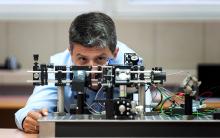Keeping a closer eye on non-invasive microscopic bio-imaging

An EU-funded project has created an ERA Chair to improve research management in the Institute of Physical Chemistry, Polish Academy of Sciences, where a new research group is developing an innovative optical-imaging method for biomedical applications, such as the diagnosis of eye diseases.









